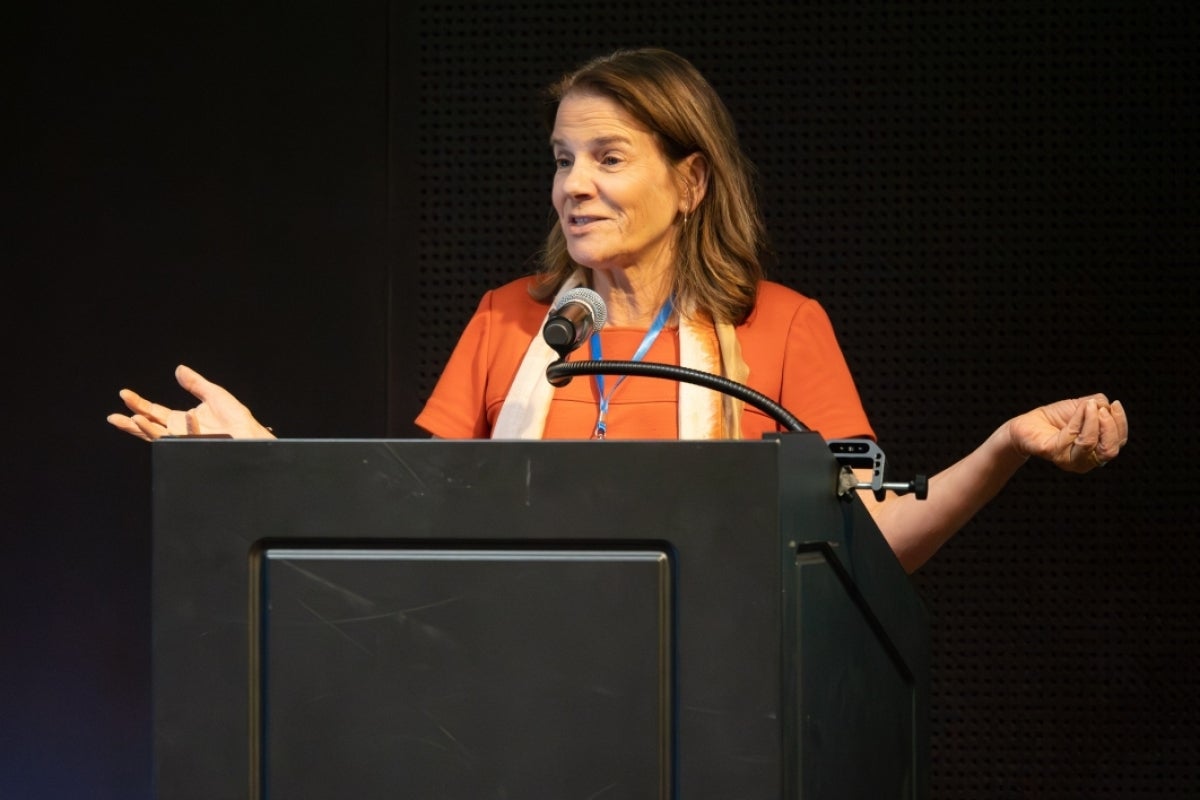Conference brings Alzheimer's research heavy hitters to ASU

Alzheimer's disease prevention and risk reduction were key focus areas of the 2023 Arizona Alzheimer's Consortium Scientific Conference, where Dr. Kristine Yaffe gave the keynote lecture. Photo by Brandon Nazari/Edson College
More than 400 scientists participated in the Arizona Alzheimer’s Consortium Annual Scientific Conference on Sept. 11.
Mayo Clinic, one of the original seven members of the consortium, hosted the conference at Arizona State University’s Tempe campus, and there were more than 100 attendees who tuned in via Zoom.
Participants were welcomed in person by Dr. William Faubion Jr., Mayo Clinic Arizona’s dean of research and associate medical director of the Center for Regenerative Biotherapeutics. There was also a video welcome featuring Mayo Clinic Arizona CEO Dr. Richard Gray and ASU President Michael Crow.
A primary focus of this year’s event was disease prevention efforts, an area keynote speaker Dr. Kristine Yaffe dedicates her science to.
“I think there are several really promising ways we can reduce risk. There are things I think we can do right now that are low cost and don’t have a lot of side effects,” she told attendees.
Yaffe is an internationally recognized expert in the epidemiology of dementia and cognitive aging and the foremost leader in identifying modifiable risk factors for dementia.
Those risk-reduction strategies include improving sleep, reducing the risk of traumatic brain injury, getting enough physical activity and addressing cardiovascular issues.
Yaffe pointed out that while it’s believed that 30–40% of Alzheimer’s disease risk might be modifiable, there needs to be a better understanding of modifiable risk factors in diverse populations.
Another area for more research is prevention trials that combine the use of drug therapy and risk reduction strategies.
“We shouldn’t be talking about drug therapies or risk reduction; they have to come together. We can’t think of these as separate. We need to know how these things work together,” Yaffe said.
ASU University Professor Eric Reiman, who is also the executive director of the Banner Alzheimer’s Institute and director of the Arizona Alzheimer’s Consortium, shared there is real promise on the preventative drug therapy side.
“We’re doing ongoing prevention trials right now of the very same treatments that were just shown to work,” Reiman said.
The goal is to find and support the approval and availability of the first secondary Alzheimer’s prevention therapies in the next three years for those who have blood test evidence of amyloid plaques but are not yet cognitively impaired.
“The general thinking currently is that amyloid clumps associated with plaques play a particularly early role in the progress of the disease, so if that’s right and we’re attacking them and preventing them from occurring in the first place, it should have a pretty profound effect,” he said.
One of the unique things about the conference is that it brings together experts from different specialties, backgrounds and research areas within the Alzheimer’s and related dementias field.
“This is a wonderful opportunity to be steeped in the cutting edge of Alzheimer's disease-related research as a person who works closely with people living with Alzheimer's, as well as their family and friends who assist them," said David Coon, associate dean of ASU’s Edson College of Nursing and Health Innovation and director of ASU’s Center for Innovation in Healthy and Resilient Aging.
In his work, Coon designs and evaluates interventions focusing on culturally diverse groups of midlife and older adults and their family caregivers to reduce stress and distress and conduct effective care planning.
“I’m committed to research that leads the way toward prevention, treatment, cures and better care,” he said.
It’s fitting that the conference falls in September, which is healthy aging month, given that cognitive health is central to overall health as we age.
“If you woke up this morning, you got a day older, and we want to understand how to make that day the best day of your life. That’s really important for avoiding all types of disease, but especially Alzheimer’s, where age is the number one risk factor,” said Matt Huentelman, TGen professor of neurogenomics.
Huentelman’s research uses genomic technologies to better understand personalized neurological disease risk and mechanisms. He’s the scientist behind MindCrowd, an online research study designed to analyze how brain performance changes with age.
So far, more than 415,000 people have participated in the study. Huentelman is hoping to reach 1 million people and is working with the Precision Aging Network to make it happen.
“I’m really pleased to be involved in the Precision Aging Network, where we are focused on people who don’t yet have Alzheimer’s disease. They may never have the disease, but we’re trying to understand what might happen individually with those people and learn how we can keep their brains functioning as well as possible for as long as possible,” he said.
More Health and medicine

Reducing waste in medical settings
Health care saves lives, but at what cost? Current health care practices might be creating a large carbon footprint,…

ASU offers bilingual counseling to Spanish speakers
Arizona is one of the five states in the nation with the highest percentage of Hispanic residents, according to the U.S.…

College of Health Solutions launches first-of-its-kind diagnostics industry partnership to train the workforce of tomorrow
From 2007 to 2022, cytotechnology certification examinees diminished from 246 to 109 per year. With only 19 programs in the…






